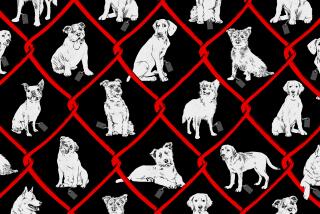In S. Africa, dogs may be a teen’s best friend
- Share via
JOHANNESBURG, SOUTH AFRICA — Half a dozen teenagers are leading scruffy dogs through a slalom of orange plastic cones in the worn asphalt yard of a veterinary clinic.
The dogs have been rescued from nearby townships; the kids, from South Africa’s criminal justice system. The teens started coming to the clinic run by Community Led Animal Welfare on Saturday mornings in late April after being arrested for theft, assault or other minor offenses.
Increasingly, South Africa is trying to keep young offenders out of juvenile detention centers and adult prisons. Officials of Khulisa, a private group helping provide alternatives, at first thought teen offenders would spend just one day with the animal welfare project, cleaning kennels or feeding dogs to fulfill a community service obligation.
Instead, the animal welfare group, known as CLAW, offered to host 15 teenagers every Saturday for six weeks.
“We kind of took it upon ourselves to go a little further because we saw something in those kids that was encouraging,” said Cora Bailey, CLAW’s founder and director.
Some of the kids have continued to show up -- of their own accord -- for more than three months now. Among them is Victor Molefe, 16, arguably CLAW’s biggest success story.
He was arrested for stealing a car part with four other boys in January. His grandmother and guardian, Lydia Molefe, said she was surprised when he was arrested. But the boy confesses that he was running with the wrong crowd, often skipping classes, smoking marijuana, and staying out late, which made his grandmother worry.
Now she says he is a “nice boy,” going to school, always home at a reasonable hour, and helping with the dishes and other chores. And he has developed a deep affection for animals.
One recent Saturday, a charming wheaten Labrador named Rupert twisted through Victor’s legs. Rupert’s owner, CLAW volunteer Barbara Hammerschlag, said the dog would not trust just anyone enough to do that.
Elza Cilliers of Khulisa said about 90% of children who completed the regimen -- which included eight weeks of life skills training and family therapy as well as the community service -- didn’t commit another crime within the first year of their arrest. But she acknowledges that for many of the kids, eight weeks is not enough.
“Many kids want to attend another session. They want someone to hug them and ask them how they are,” Cilliers said.
South Africa has been trying to get children out of the formal criminal justice system since 1992, when nongovernmental organizations in cooperation with public prosecutors and probation officers first piloted programs aimed at teaching juveniles to take responsibility for their actions and avoid getting into trouble. After completing programs like the one run by Khulisa, first-time offenders’ records are cleared.
Ann Skelton, a human rights lawyer who helped draft the Child Justice Bill, which includes a provision to encourage getting children out of the formal justice system, said that about 10% of juveniles who were arrested were currently diverted into programs like Khulisa’s, but that that number should be higher.
“We know that serious violent crimes make up about 30% of the offenses; that would give us about 70% that we could go at, though some you couldn’t divert because they were secondary offenses,” Skelton said.
And that could indirectly drive a continued drop in the number of children awaiting trial in adult prisons. With fewer cases for courts to deal with, those awaiting trial would move more quickly through the formal justice system. The number of children awaiting trial in prison dropped from a high of 2,934 in 1999 to 1,238 in 2005, according to the most recently available government figures.
All the teenagers spending their Saturdays at CLAW have seen the charges filed against them withdrawn.
Bailey, CLAW’s founder and director, said her priority was to teach the kids respect for animals. She said animal abuse and neglect were still often tolerated in the townships the teens come from, where CLAW had worked exclusively since 1999.
“If you look at a home where there’s a deliberately abused animal, you will find that there are abused women or abused children. . . . I think if you can learn to understand an animal and learn to take responsibility and relate to something that’s helpless and that needs you, it’s good for anybody.”
So CLAW has been teaching the kids how to approach an animal and how to identify when an animal is sick. The kids were promenading the dogs around the clinic’s yard on a recent Saturday as part of their first lesson in dog training.
“The first time they came I thought this wasn’t going to work,” Bailey said. In South Africa’s townships many dogs are trained to attack, and the teens initially were terrified by the canines at the clinic.
Bailey said Rupert, the Lab, broke the ice by jumping rope and dancing to “The Locomotion” with his owner.
Rupert’s friend Victor Molefe said that before coming to CLAW, he hated dogs. Now he jolts out of bed at 5 a.m. each Saturday, eager to get to the clinic and play with his furry friends, even though his ride there doesn’t arrive until 9 a.m.
“I used to kick dogs,” Molefe said. “But from now on, whenever I see a person kick a dog it’s like he’s kicking me.”
More to Read
Sign up for Essential California
The most important California stories and recommendations in your inbox every morning.
You may occasionally receive promotional content from the Los Angeles Times.













